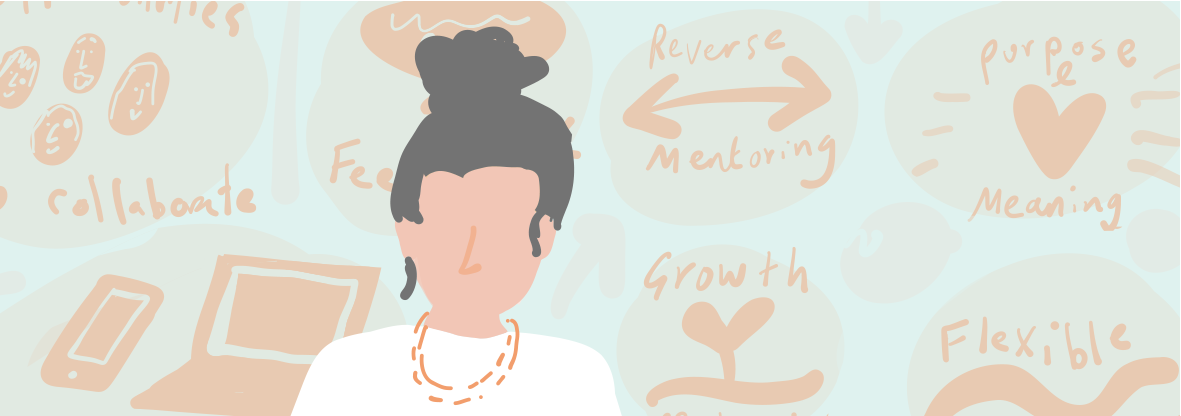Mentoring Millennials: How to Tailor Your Approach

When mentoring millennials, it’s important to know what resonates with this generation, what makes them excited and their preferred learning style so you can adapt your mentoring approach.
Mentoring millennials requires a tailored approach that takes into account their unique traits, preferences and goals. By adapting your style to cater to this group, you can help propel them towards a future that’s filled with growth, success and meaningful impact.
Who Are Millennials?
Millennials (also known as Generation Y) were born between 1981 and 1996, growing up in a digital age with access to technology, so their attitudes and expectations may differ from those of older generations. When mentoring millennials, it’s important to remember that this generation grew up in a period of rapid technological development and cultural upheaval, which shaped their approach to the world of work. Being aware of some shared characteristics can help you better understand millennials’ preferred learning styles and reactions to information.
Typically, they like having a good balance between work and life (who doesn’t?!), and many Gen Y members want a job that has meaning and purpose. This generation are likely to be in work for longer than their older peers as the retirement age has shifted, so they want a career that they love and has them excited to wake up each morning.
Teamwork and collaboration are highly valued by millennials and they tend to thrive in workplace cultures that value diversity and encourage individuality.
3 Key Things to Consider When Mentoring Millennials
If you’re responsible for mentoring millennials in the workplace or as a side hustle, it’s essential to bear in mind their preferred working and learning styles (we hate to generalise…but there are definitely some common trends!).
1. Continuous Learning
Many millennials thrive on continuous learning and personal development. They appreciate growth opportunities, whether through formal training programmes or informal knowledge sharing. Engage millennial mentees in conversations about their career aspirations. From there, you can guide them to achieve (and smash) their goals.
2. Reaction to Feedback
Millennials also value feedback and seek regular communication. They appreciate clear expectations and constructive criticism to improve their performance. Providing regular feedback and recognising their achievements can foster a positive and supportive mentor-mentee relationship.
3. Integrate Technology
Millennials are comfortable with technology, so embrace digital tools and platforms to facilitate communication, collaboration and knowledge sharing when mentoring them. Virtual mentoring via video calls and making use of online resources will enhance the mentoring experience for Gen Y.
How to Approach Mentoring Millennials
If you want to be successful in mentoring millennials in the workplace, you’ll need to adapt your mentoring style to fit the needs and preferences of your audience. By understanding millennials’ ways of working and learning, you can build a mentoring relationship that helps them grow and develop in a way that benefits both of you.
When mentoring millennials, it’s important to keep in mind the following:
1. Embrace Reverse Mentoring
Millennials are often well-versed in emerging trends, technology and digital tools. Recognise their expertise and offer opportunities for reverse mentoring. This approach allows your mentee to share their knowledge and insights with you, creating a reciprocal learning dynamic. By embracing reverse mentoring, you demonstrate that you value their perspectives and can benefit from their unique skill sets.
2. Foster a Collaborative Environment
Most millennials thrive in collaborative and inclusive work environments. Encourage teamwork and provide opportunities for them to engage in group projects, cross-functional initiatives and team discussions where possible. This will help them to leverage their strengths, contribute their ideas and develop their teamwork and communication skills. By fostering a collaborative environment, you can help your millennial mentee to feel valued and create a space where their contributions can flourish.
3. Provide Flexible Learning Opportunities
Millennials appreciate flexible learning options that fit their busy schedules and desire for continuous growth. When mentoring millennials in the workplace, think about providing a range of learning possibilities such as formal classes, online courses and self-study with a mentor. This will allow them to investigate areas of interest, study at their own pace and take control of their career journey. By allowing for versatility in learning, you’ll empower your millennial mentee to actively participate in their professional growth.
4. Offer Bite-Sized Mentoring
Recognise that millennials often prefer shorter, more frequent interactions over long, formal mentoring sessions. Consider offering mentoring in bite-sized formats that can easily fit into their busy lives. Quick check-ins, virtual coffee chats, informal lunch discussions or even flash mentoring can be highly effective in providing guidance, support and feedback. These shorter interactions allow for ongoing mentorship and help millennials stay engaged and motivated.
5. Be Open to New Communication Channels
Millennials are familiar with a variety of communication channels beyond traditional emails and phone calls (in fact, some find a ringing phone one of the scariest things to deal with). Embrace technology and explore different communication tools such as instant messaging, video conferencing and collaboration platforms to support your mentoring partnership. These channels provide a more dynamic and interactive way to stay connected, exchange ideas and provide timely feedback. By being open to new communication channels, you demonstrate your willingness to adapt to their preferred methods of engagement.
6. Promote Autonomy and Entrepreneurial Thought
Millennials tend to prize independence and the chance to ‘own’ their job. Encourage them to think creatively, explore new ideas and take initiative. Provide your millennial mentees with challenging projects and opportunities to make decisions and solve problems independently. By mentoring millennials to think critically and independently, you’ll boost their confidence and create a supportive environment that nurtures their potential.
Perfect Your Style for Mentoring Millennials
Mentoring millennials is not about establishing clear generational lines but rather about promoting understanding and changing your methods as a mentor to support their growth and development. If you’re a member of Gen X or older, mentoring millennials in the workplace can even teach you a thing or two and encourage you to approach your own job differently. And mentoring Gen Z (they’re the people younger than millennials) can provide you with a whole other perspective.
Our top advice for mentoring millennials is to remain open-minded, embrace their preferred learning and working styles, adapt your communication methods to suit and this could be the start of a beautiful mentor-mentee relationship.
To get opportunities to mentor millennials – and people of all other ages! – sign up to become a Career Navig8r today.


